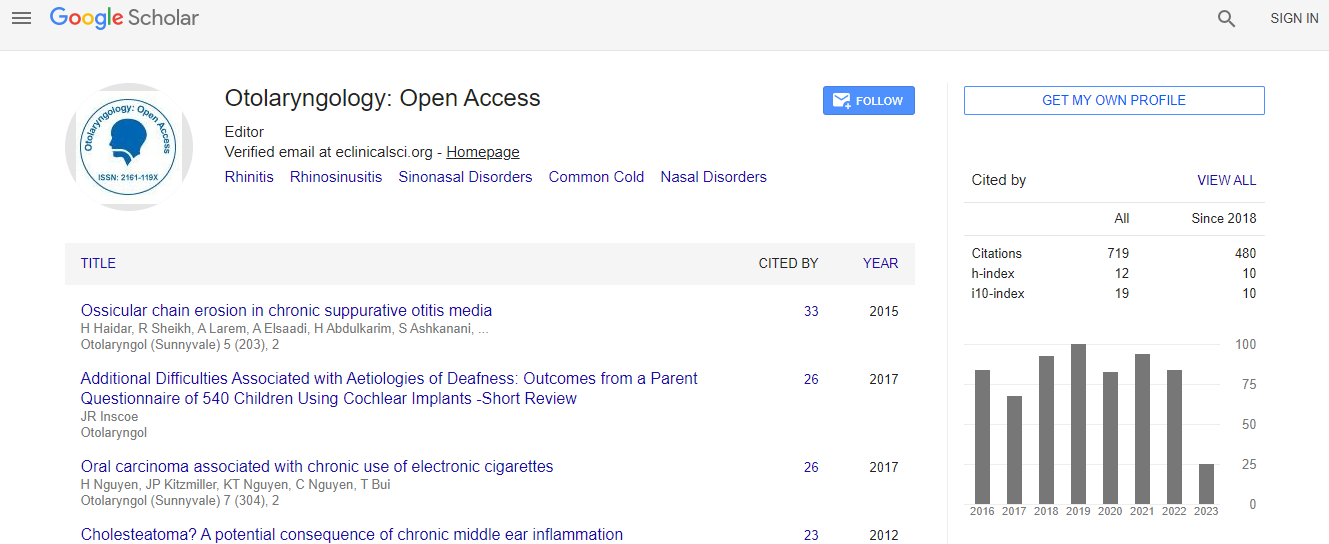Our Group organises 3000+ Global Conferenceseries Events every year across USA, Europe & Asia with support from 1000 more scientific Societies and Publishes 700+ Open Access Journals which contains over 50000 eminent personalities, reputed scientists as editorial board members.
Open Access Journals gaining more Readers and Citations
700 Journals and 15,000,000 Readers Each Journal is getting 25,000+ Readers
Google Scholar citation report
Citations : 925
Otolaryngology: Open Access received 925 citations as per Google Scholar report
Otolaryngology: Open Access peer review process verified at publons
Indexed In
- Index Copernicus
- Google Scholar
- Sherpa Romeo
- Open J Gate
- Genamics JournalSeek
- RefSeek
- Hamdard University
- EBSCO A-Z
- OCLC- WorldCat
- Publons
- Geneva Foundation for Medical Education and Research
- ICMJE
Useful Links
Recommended Journals
Related Subjects
Share This Page
Gentamicin dosing schedules, monitoring and beliefs: A cause for concern
International Conference and Exhibition on Otolaryngology
David D Pothier
ScientificTracks Abstracts: Otolaryngology
Abstract
The safety of different gentamicin dosing regimens has been studied extensively in the context of nephrotoxicity. By comparison gentamicin-induced vestibulotoxicity appears insufficiently documented and is under-recognized clinically. A review of 46 patients who presented to a tertiary referral neurotology multidisciplinary clinic between 1993 and 2009 was performed and the effects of single daily dosing versus multiple daily dosing regimens in the causation of their clinical presentation assessed. Time to ototoxicity and dosing levels were used as primary outcome measures. Nineteen of 44 patients (43.1%) were identified to have gentamicin vestibulotoxicity without accompanying nephrotoxicity; of these, only two patients had complaints of tinnitus or deafness. Eighteen had substantial imbalance and oscillopsia. All patients (n=19) had a clinically significant loss of dynamic visual acuity and a bilaterally positive high velocity head impulse test. Magnetic scleral search coil testing was used to confirm the presence of a diminished vestibulo-ocular reflex at high velocities. Importantly, caloric testing in highly symptomatic patients was often normal. The time delay from the beginning of treatment to the onset of vestibulotoxicity was significantly shorter in patients who received single daily dosing gentamicin than those who received multiple daily dosing regimens (mean 15.7 vs. 33.0 days, p<0.04), despite a significantly lower total cumulative dose (4.99 vs. 7.95 grams, p<0.003) Gentamicin vestibulotoxicity can occur in the absence of nephrotoxicity. Although now more commonly used owing to reduced nephrotoxicity, single daily dosing is more damaging to the vestibular organs and causes damage at an earlier stage. Traditional methods of detecting inner ear toxicity yielded rare findings. Most patients with vestibulotoxicity complained of imbalance and oscillopsia that could be identified with simple bedside testing. The troubling results of a survey of the beliefs and practices of doctors who commonly prescribe gentamicin are discussed. An urgent educational partnership with physicians who prescribe gentamicin regularly is vital to avert what may become a major problem in development.Biography
Dr.Pothier attended medical school at the University of Cape Town, South Africa. He then undertook his Otolaryngology training in London and the South West of England. Fellowship trained in Neurotology in Toronto, Canada where he now works as an Otologist/Neurotologist with an interest in middle ear and vestibular disorders, as well as Health Informatics. He has a primary research interest in bilateral vestibular loss. He has published over 80 peer- reviewed articles and has a Bacon number of 4.

 Spanish
Spanish  Chinese
Chinese  Russian
Russian  German
German  French
French  Japanese
Japanese  Portuguese
Portuguese  Hindi
Hindi 
